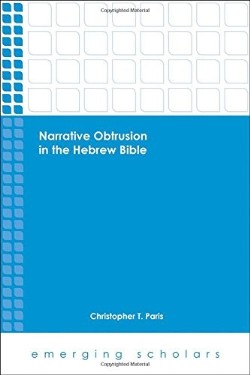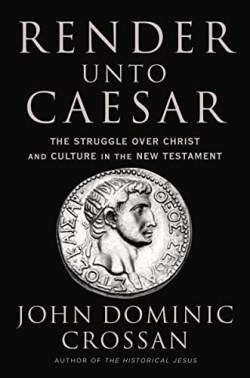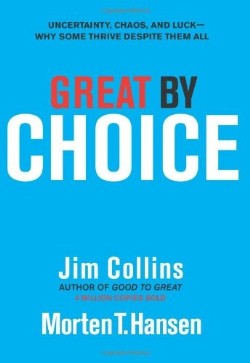Narrative Obtrusion In The Hebrew Bible
$49.00
Narrative critics of the Hebrew Bible often describe the biblical narrators as “laconic,” “terse,” or “economical.” The narrators generally remain in the background, allowing the story to proceed while relying on characters and dialogue to provide necessary information to readers. On those occasions when these narrators add notes to their stories, scholars may characterize such interruptions as “asides” or redactions.
Christopher T. Paris calls attention to just these narrative interruptions, in which the storyteller “breaks frame” to provide information about a character or even in order to direct reader understanding and, Paris argues, to prevent undesirable construals or interpretations of the story.
After surveying the phenomenon of omniscient narration and narrative obtrusiveness in the Hebrew Bible and other ancient Near Eastern literature, Paris focuses on the Deuteronomistic History. Here the narrator occasionally obtrudes into the narrative to manage or deflect anticipated reader questions and assumptions, sometimes invoking the divine, sometimes protecting a favored character, in an interpretive stance that Paris compares with the commentary provided by later rabbis and in the Targums. Attention to narrative obtrusion offers an entry point into the world of the narrator, Paris argues, and thus promises to redefine aspects of narrative criticism.
in stock within 3-5 days of online purchase
SKU (ISBN): 9781451482119
ISBN10: 1451482116
Christopher Paris
Binding: Trade Paper
Published: July 2014
Emerging Scholars
Publisher: Augsburg Fortress Publishers – 1517 Media
Print On Demand Product
Related products
-
Render Unto Caesar
$28.99Add to cartThe revered Bible scholar and author of The Historical Jesus explores the Christian culture wars–the debates over church and state–from a biblical perspective, exploring the earliest tensions evident in the New Testament, and offering a way forward for Christians today.
Leading Bible scholar John Dominic Crossan, the author of the pioneering work The Historical Jesus, provides new insight into the Christian culture wars which began in the New Testament and persist strongly today.
For decades, Americans have been divided on how Christians should relate to government and lawmakers, a dispute that has impacted every area of society and grown more rancorous over the past forty years. But as Crossan makes clear, this debate isn’t new; it can be found in the New Testament itself, most notably in the tensions between Luke-Acts and Revelations.
In the texts of Luke-Acts, Rome is considered favorably. In the book of Revelations, Rome is seen as the embodiment of evil in the world. Yet there is an alternative to these two extremes, Crossan explains. The historical Jesus and Paul, the earliest Christian teachers, were both strongly opposed to Rome, yet neither demonized the Empire.
Crossan sees in Jesus and Paul’s approach a model for Christians today that can be used to cut through the acrimony and polarization roiling our society and dividing us.
-
Great By Choice
$29.99Add to cartThe new question
Ten years after the worldwide bestseller Good to Great, Jim Collins returns with another groundbreaking work, this time to ask: Why do some companies thrive in uncertainty, even chaos, and others do not? Based on nine years of research, buttressed by rigorous analysis and infused with engaging stories, Collins and his colleague, Morten Hansen, enumerate the principles for building a truly great enterprise in unpredictable, tumultuous, and fast-moving times.The new study
Great by Choice distinguishes itself from Collins’s prior work by its focus not just on performance, but also on the type of unstable environments faced by leaders today.With a team of more than twenty researchers, Collins and Hansen studied companies that rose to greatness-beating their industry indexes by a minimum of ten times over fifteen years-in environments characterized by big forces and rapid shifts that leaders could not predict or control. The research team then contrasted these “10X companies” to a carefully selected set of comparison companies that failed to achieve greatness in similarly extreme environments.
The new findings
The study results were full of provocative surprises. Such as:The best leaders were not more risk taking, more visionary, and more creative than the comparisons; they were more disciplined, more empirical, and more paranoid.
Innovation by itself turns out not to be the trump card in a chaotic and uncertain world; more important is the ability to scale innovation, to blend creativity with discipline.
Following the belief that leading in a “fast world” always requires “fast decisions” and “fast action” is a good way to get killed.
The great companies changed less in reaction to a radically changing world than the comparison companies.
The authors challenge conventional wisdom with thought-provoking, sticky, and supremely practical concepts. They include: 10Xers; the 20 Mile March; Fire Bullets, Then Cannonballs; Leading above the Death Line; Zoom Out, Then Zoom In; and the SMaC Recipe.Finally, in the last chapter, Collins and Hansen present their most provocative and original analysis: defining, quantifying, and studying the role of luck. The great companies and the leaders who built them were not luckier than the comparisons, but they did get a higher Return on Luck.
This book is classic Collins: contrarian, data-driven, and uplifting. He and Hansen show convincingly that, even in a chaotic and uncer






Reviews
There are no reviews yet.